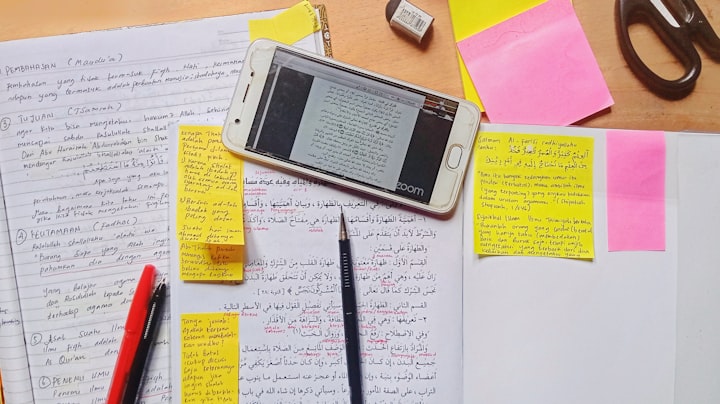9 Tips For Writing Your College Essays In Half The Time
From your friend neighborhood English BA

As an English major, I have written a lot of essays. And, despite what many would believe, it was not always easy for me. Even a paper of only four or five pages could take multiple weeks and several hours to get right. But, after four years, I finally figured out how to write a college essay (of moderate length) within only a few hours.
Before getting into my tips, I should note that the majority of the essays I wrote were literary analyses or history. Thus, these tips will mostly be related to essays within those spheres. While some tips are general enough to work for any class, others may not.
Without further ado, here are my tips for writing a quality essay quickly.
#1: Solidify Your Thesis First
Your thesis is the most important part of your paper. It will set the tone for the rest of your paper. It IS the argument while the rest of the essay supports it. Figuring out your thesis can take days on its own. Typically, a few days before I write the rest of the paper, I write out a few thesis statements and pick the one I feel most excited about.
Once the thesis statement is narrow, but not too narrow, and well written, keep it at the top of the document for reference and even edits if necessary.
#2: Write Body Paragraphs First
It is tempting to write the introduction paragraph first. However, writing the introduction and conclusion paragraphs becomes easier once the argument is fully fleshed out. Additionally, the body paragraphs take the longest to write and getting them done first makes it go much faster.
#3: Note Page Numbers As You Write
When noting a source, citations are required. In my early days of college, I was in such as rush to find quotes that I wouldn't write down the page number of the quote. Therefore, this left me going back afterward to find the quote to properly cite it. It is much easier to simply cite the page number at the time.
#4: Keep Quotes Separately
If you have quotes you know are going to use, but don't know where yet, or have not reached that part of the essay, keep them written down or typed in another document (or the same document if comfortable working around it). This allows you to properly cite the quote and work it in naturally so that it does not interrupt t the overall flow of the paper.
#5: Let It Flow
When we are first taught to write an essay, we are provided with the five paragraph essay where the three body paragraphs each present a different argument in defense of the thesis. When first learning to write an essay, this is absolutely a helpful tool to help understand how to structure it.
However, as the arguments become more complex, so will the structure. Do not hold back your argument by falling into the five paragraph trap. Let your arguments flow naturally from one into the other. This may mean that one argument takes up three short paragraphs, one is one long paragraph, and the other argument encompasses one long paragraph and one short one.
As long as the arguments make sense and the paragraphs each have a purpose (which does not have to be an entire argument), then the structure of the essay is likely fine.
#6: Use A Reliable Grammar Checker
I normally subscribe to the "do not edit as you go" philosophy with the exception of especially egregious issues. Spending too much time correcting mistakes can lead to you losing your train of thought or a noticeable interruption in flow or tone.
To help prevent this and get the best of both words of editing as you go and not, I recommend using an outside spell/grammar checker. Google Docs and Microsoft Word do have decent spell checkers, but they will not catch everything.
Grammarly is free and comes as a browser extension. It will also help identify tone issues (by providing you with the detected tone) and wordy sentences. It also makes it easy to quickly correct a typo, but also go back after you are done writing and quickly go through Grammarly's recommendations and accept or reject them (or otherwise fix them).
#7: Write Your Introduction & Conclusion Paragraphs Last
I alluded to this earlier when noting that it is generally better to write the body paragraphs first. This is because it becomes much easier to sum up, introduce, and conclude a paper once you have already written it. With the exception of a thesis, it is best to avoid writing any of the introduction or conclusion paragraphs before finishing the body of the essay.
I also have found this helpful because the argument/thesis of my paper sometimes changes slightly while writing. Instead of having to rewrite large portions of the essay, I may only need to make a few small tweaks to the body paragraphs, but likely will not have to do major rewriting.
#8: Leave Yourself Notes
If you have a good introduction idea or are worried about forgetting an important argument, use the comments function--or some other method--to write down these ideas to prevent yourself from forgetting them. This is adaptable to several styles. For example, you can physically write them down and reference them as you type, or you can keep them open in anoter document and tab.
#9: Make A Rough Outline
Some writers love to outline. I don't. That's not to say I do no prewriting though. I usually roughly map out the order I plan to present my arguments and any quotes I have picked out, I may try to place in these sessions. I'm not determining the number of paragraphs ahead of time, but rather the points I want to make.
This makes it easier to find a natural flow and keep yourself on track. If you are the type of writer that likes to make an extensive outline, go for it, it will also save you time in the long run.
About the Creator
Alisan Keesee
I am a 26-year-old who lives with my cat. Originally from a small, unincorporated Washington town, I have a penchant for boybands, black coffee, and true crime. I am a graduate of Western Washington University.






Comments
There are no comments for this story
Be the first to respond and start the conversation.